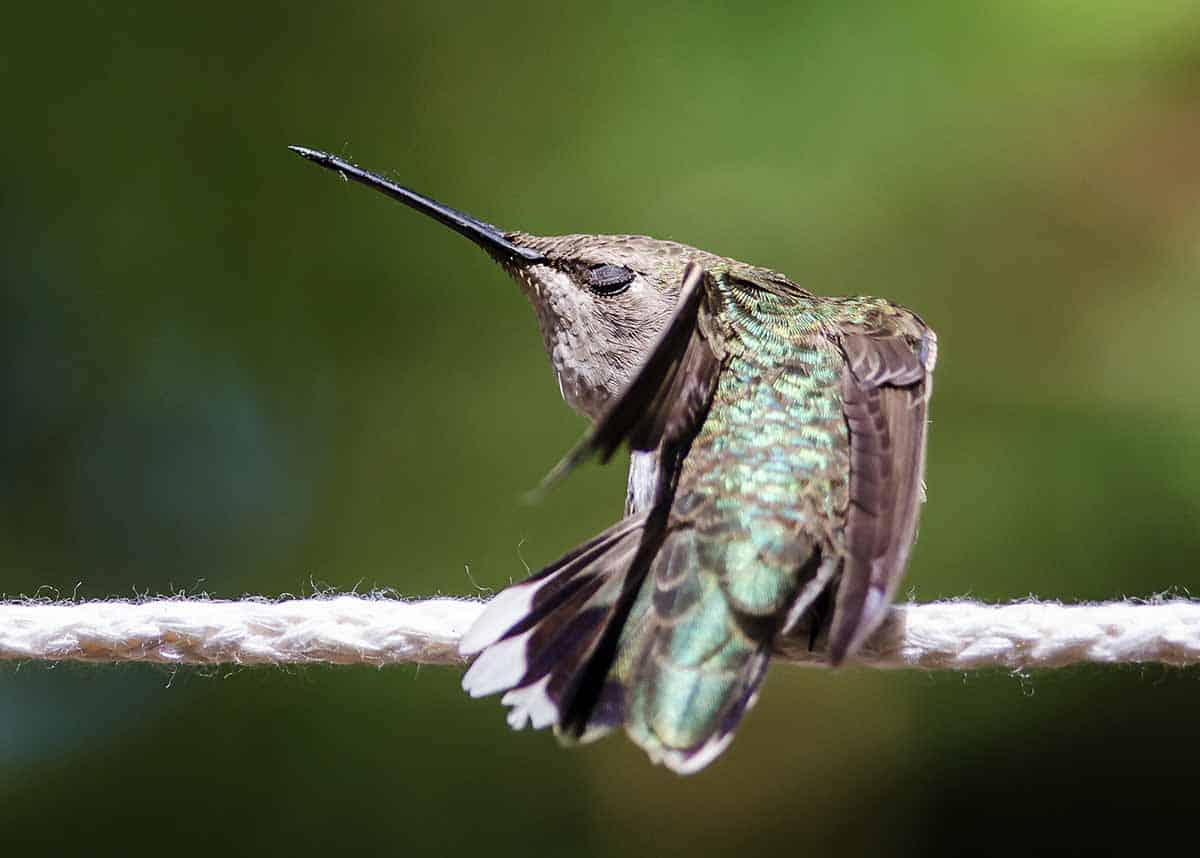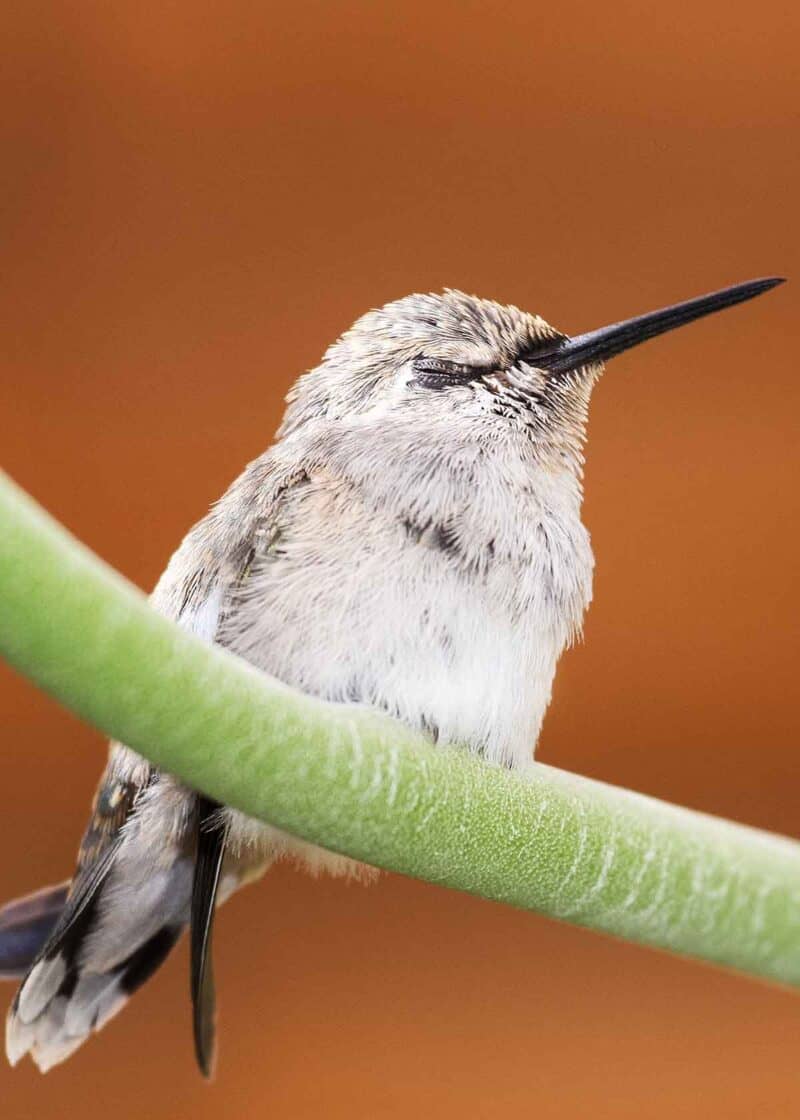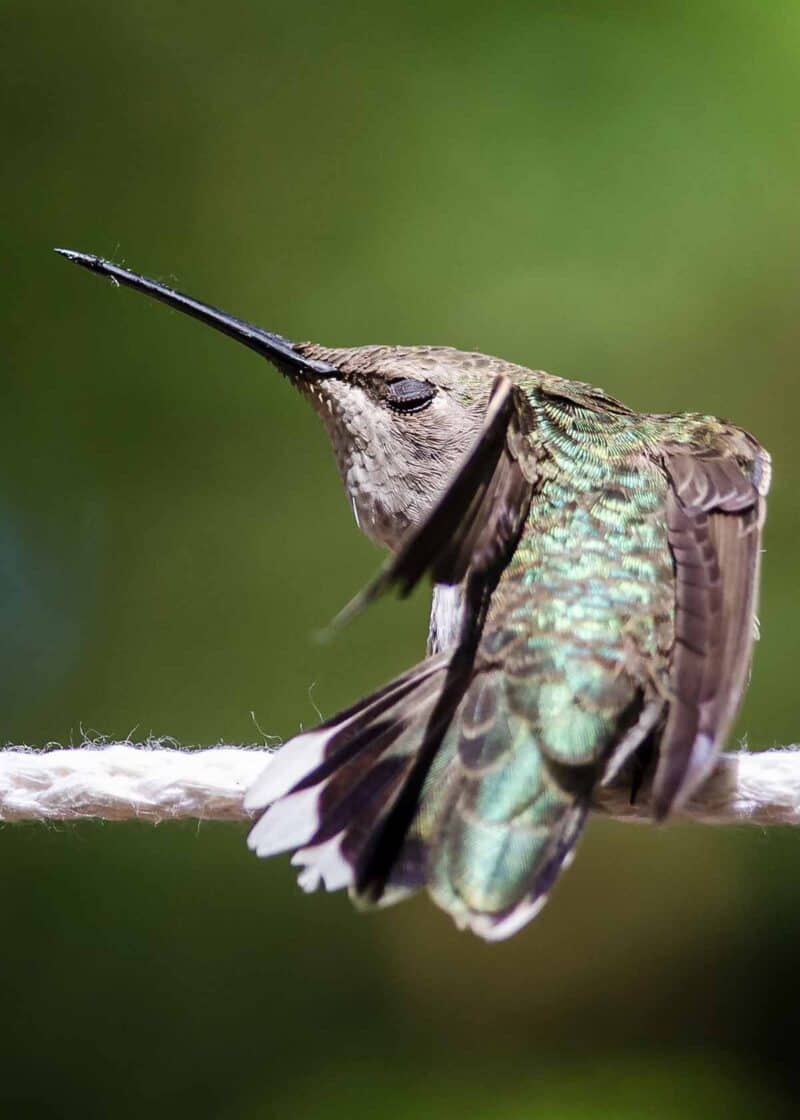Hummingbirds have the fastest heartbeat on the planet, aside from the Estrucan shrew. One of the most incredible facts about hummingbirds is that their hearts beat 1260 beats per minute. This must tire them out quickly.
Do hummingbirds sleep? Yes, but it’s not how you might imagine. Hummingbirds go into a hibernation-type state, lowering their heart rate and body temperature. In torpor, they can even sleep upside down. And it can 20 minutes to awaken.

Do hummingbirds sleep? And for how long, when, and how often? Keep reading to learn about torpor, hibernation, and everything else concerning hummingbird sleep.
Table of Contents
Hummingbird Sleep Guide
Hummingbirds sleep every day, going into a state known as torpor.
What Is Torpor?
When a hummingbird sleeps, it’s called torpor. Torpor is a deep hibernation-like sleep that allows the hummingbird to take a break. During torpor, the hummingbird’s heartbeat goes from 1200 bpm to less than 200 bpm.
Why torpor? If a hummingbird slept without going into a state of torpor, they’d use too much energy and have to keep waking up every few minutes due to their speedy metabolism.
In the state of torpor, the hummingbird’s metabolism slows down to allow its core temperature to drop so that it can save more energy for its wake hours.
After torpor, it takes up to an hour for the hummingbird to come alive again. During the waking process, the hummingbird takes in more oxygen and shivers until its body warms up enough to carry on with its day.
Here’s a great video showing a hummingbird in torpor, hanging upside down.
Where Do Hummingbirds Sleep?
If you catch a hummingbird in a torpor state, you’ll likely find them barricaded on a twig where there is low wind. You may also find them in a nest if they’ve just bred, protecting their young.
Often, you might find the hummingbird sleeping upside down. While it isn’t their natural sleeping position, they may slip and hang by their feet during a torpor state.
When Do Hummingbirds Sleep?
Hummingbirds enter a state of torpor once daily, regardless of the hour. While it can happen at any time of day or night, it’s more common to torpor through the night.
Before torpor happens, hummingbirds will ensure they’re well-fed to endure the entire process.
How Long Does Torpor Last?
The torpor timeframe is different for each hummingbird, but on average, torpor can last up to 12 hours.
However, the length of inactivity differs based on territorial issues, predator sightings, weather, and food supply.
If you see a hummingbird that looks dead or is not breathing, it’s most likely in a torpor state. Touching or waking it can lead to severe problems for hummingbirds as they need at least 20 minutes to awaken from this hypothermic state.

How Does Torpor Help a Hummingbird Survive?
There are two main reasons why torpor is beneficial to hummingbirds.
- Regulate body temperature
- Conserves energy.
When a hummingbird is active during the day, its core temperature can rise to 105 – 108 F (40 C). During torpor, a hummingbird’s temperature will decrease to 68 F (20 C), almost to the point of hypothermia.
Decreasing temperature to that extreme helps the hummingbird stay alive through colder weather.
That said, a temperature reduction also helps the hummingbird conserve energy, as their heart rate slows down by over 60%. In this case, torpor helps save energy as the hummingbird uses fewer calories to keep them alive, which are needed to maintain respiration and blood circulation.
Hummingbirds have the highest heart rate, only second to the tiny Etruscan shrew (1500 bpm).
Do Hummingbirds Hibernate?
No, hummingbirds do not hibernate. Most people see hummingbirds throughout the day and rarely at night – even during colder seasons. You’ll see a hummingbird at night because they’re migrating or confused by artificial lighting.
Difference Between Hibernation and Torpor
Hibernation is similar to torpor, where the body reduces to low temperatures and decreases heart rates during both torpor and hibernation.
- Torpor lasts up to 12 hours; hibernation can last up to seven months.
- Before hibernation, mammals will eat double their body weight. With torpor, the hummingbird will eat throughout the day (about every 15 minutes) to survive and prepare for nightly torpor.
Love hummingbirds? Here’s how to choose the best hummingbird feeder.

Keep reading: 35 Most Colorful Animals in the World
Conclusion
So, do hummingbirds sleep? Yes, hummingbirds usually pick the same place to rest every night, known as torpor. The main difference between torpor and hibernation is that hibernation lasts four to seven months.
Hummingbirds need torpor to survive due to their fast metabolism and rapid heart rate. Each animal that experiences hibernation and torpor undergoes reduced activity to help sustain its quality of life.
Drew Haines is an animal enthusiast and travel writer. She loves to share her passion through her writing.
She graduated high school at sixteen and started her own business, Everywhere Wild Media. And she runs Everywhere Wild and JustBirding. She also guest blogs on Storyteller.Travel
She lived in Ecuador for 6 years and explored the Galapagos Islands. Currently based in N.S., Canada.
